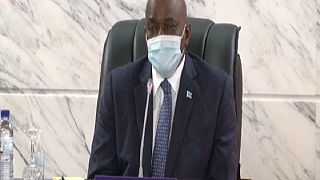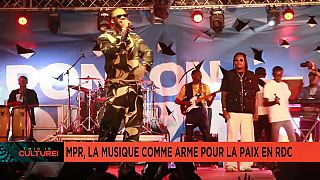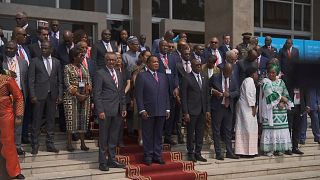Republic of the Congo
The Constitutional Court of the Republic of Congo on Tuesday endorsed the re-election of President Denis Sassou Nguesso in the March 21 vote, after rejecting the opposition's appeal.
"On the final results of the election (...), the Constitutional Court has made the necessary rectifications and adjustments. The candidate Denis Sassou Nguesso, who won 88.40% of the presidential vote, has been declared elected," said Auguste Iloki, president of the country's highest judicial body.
"The appeals for annulment and postponement of the presidential election" presented by Mathias Dzon, Jean-Jacques Serge Yhombi Opango and Christian Mozoma are deemed "inadmissible", he added.
At the end of March, these opponents had filed appeals against the landslide re-election in the first round of Mr. Sassou Nguesso who was credited with 88.57% of the vote, according to the provisional results.
During the electoral campaign, the outgoing president placed peace, youth and the development of agriculture at the top of his priorities in order to get out of the oil industry and dependence on imports.
Mr Sassou Nguesso, 77, has spent a total of 36 years in power in Congo-Brazzaville leading authoritarian regimes in the small oil-rich central African country.
- Background and Context -
The 77-year-old Denis Sassou Nguesso has been definitively elected president of Congo-Brazzaville for a fourth term, according to a ruling by the Constitutional Court, which deemed "inadmissible" the appeals of opponents calling for the annulment of the election.
During the election campaign, Mr Sassou Nguesso, who has spent 36 years in power at the head of authoritarian regimes in this small central African country, placed peace, youth and the development of agriculture at the top of his priorities to get out of the all-oil and import dependency.
"On the final results of the election (...) the Constitutional Court has made the necessary rectifications and adjustments. The candidate Denis Sassou Nguesso, who won 88.40% of the presidential vote, has been declared elected," said Auguste Iloki, president of the country's highest judicial body.
"The appeals for annulment and postponement of the presidential election" presented by Mathias Dzon, Jean-Jacques Serge Yhombi Opango and Christian Mozoma are deemed "inadmissible", he added: "The requests for annulment and postponement of the election are unfounded.
At the end of March, these opponents had filed appeals against the landslide re-election in the first round of Mr. Sassou Nguesso, who was credited with 88.57% of the vote, according to the provisional results.
"It's almost the same thing. It's clear, it's a plebiscite," said Emmanuel Oko, a lawyer for President Sassou Nguesso.
- Death of the main opponent -
His re-election was marked by the death of his main opponent Guy-Brice Parfait Kolélas, victim of a severe form of Covid-19. Proclaimed second with just over 7% of the vote, Guy-Brice Parfait Kolélas died the day after the election during his medical transfer to France.
"We bow to the result of the Constitutional Court, but we believe that the problem remains. How can we proclaim the results of Guy-Brice Parfait Kolélas who, having died, loses his legal personality", said Mr Jean-Philippe Esseau, the lawyer for Mr Yhombi Opango.
The turnout was 67.55%.
President Sassou Nguesso will be sworn in in the coming days for a fourth five-year term.
He will face several challenges, including the fight against unemployment, which affects the majority of the population, especially young people. Access to drinking water and electricity remains the main concern of the Congolese population, with a growing rural exodus.
The country must diversify its economy, which has long been dependent on oil. It is struggling to release a second tranche of funding under a 2019 agreement with the International Monetary Fund (IMF), which includes some fifty measures.
Sassou Nguesso came to power in 1979 under single-party rule after ousting Jacques Joachim Yhombi Opango, a military officer from the northern Cuvette region.
He lost the first multi-party election in 1992 before regaining power by force of arms in 1997 with the support of Angolan troops.
His last re-election, in 2016, with 60% of the vote, was violently contested, after a campaign that was much more contested than the one in 2021.











00:58
Voting underway in Somalia's breakaway region of Somaliland
Go to video
US announces visa restrictions for Ghana
Go to video
Tunisia: Kais Saïed takes oath for his 2nd presidential term
01:11
Frelimo's candidate wins in Maputo amid ongoing vote count
01:40
Young Tunisians disillusioned by economy, pace of change
00:57
Kais Saied's landslide reelection strengthens his grip on power